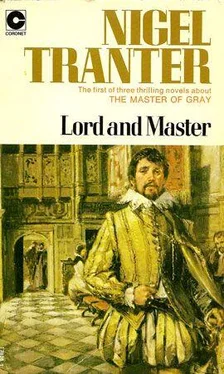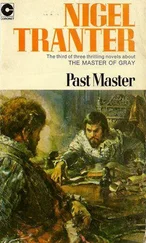Nigel Tranter - Lord and Master
Здесь есть возможность читать онлайн «Nigel Tranter - Lord and Master» весь текст электронной книги совершенно бесплатно (целиком полную версию без сокращений). В некоторых случаях можно слушать аудио, скачать через торрент в формате fb2 и присутствует краткое содержание. Жанр: Исторические приключения, на английском языке. Описание произведения, (предисловие) а так же отзывы посетителей доступны на портале библиотеки ЛибКат.
- Название:Lord and Master
- Автор:
- Жанр:
- Год:неизвестен
- ISBN:нет данных
- Рейтинг книги:4 / 5. Голосов: 1
-
Избранное:Добавить в избранное
- Отзывы:
-
Ваша оценка:
- 80
- 1
- 2
- 3
- 4
- 5
Lord and Master: краткое содержание, описание и аннотация
Предлагаем к чтению аннотацию, описание, краткое содержание или предисловие (зависит от того, что написал сам автор книги «Lord and Master»). Если вы не нашли необходимую информацию о книге — напишите в комментариях, мы постараемся отыскать её.
Lord and Master — читать онлайн бесплатно полную книгу (весь текст) целиком
Ниже представлен текст книги, разбитый по страницам. Система сохранения места последней прочитанной страницы, позволяет с удобством читать онлайн бесплатно книгу «Lord and Master», без необходимости каждый раз заново искать на чём Вы остановились. Поставьте закладку, и сможете в любой момент перейти на страницу, на которой закончили чтение.
Интервал:
Закладка:
The Earl of Gowrie, ostensibly pardoned by the King on Patrick's advice, when the rest of the Ruthven lords were banished the country, was arrested on a visit to Dundee, presumably on the orders of Arran, removed forthwith to Stirling, and there tried by a hastily assembled but carefully selected panel of his peers on a charge of high treason against the King's person, unanimously found guilty, and beheaded the same night His servants managed to recover the head from its lofty spike on the Castle battlements, and having sewed it back on to the body, hastily gave the remains a form of burial. So ended the great Greysteil, second only to Morton as James's childhood bogey. Patrick made a speech in his favour, as became an affectionate nephew – but found surprisingly little of good to put forward in his defence. His faithfulness to the end, however, was in due course rewarded handsomely by large royal grants of the deceased's forfeited property, so that the estates did not altogether go out of the family, though Gowrie's widow and sons, of course, were reduced to penury.
Then the Estates of Parliament duly passed Arran's Black Acts, against the violent opposition of the Kirk – the Kirk as opposed to the Church, that is, for of course the new bishops and
commendators voted solidly for them. Under their provisions treason became the commonest offence in the land, the King was to rule the Kirk, and its revenues were made readily transferable – far-seeing legislation that even the Pope of Rome could scarcely have improved upon.
In May, Arran had Argyll declared officially unfit owing to ill-health, and became authentically Chancellor. A month or two later he had himself appointed Governor of Edinburgh Castle as well as Stirling, and for good measure, Lord Provost of Edinburgh. There were few more offices that he could usefully aspire to.
David watched all this with alarm, doubt and wonder. Alarm at what misgovernment and personal greed was doing to Scotland, was always doing to Scotland; doubt as to what, if anything, could be done to amend the situation, by such as himself; and wonder that Patrick seemed to be not only so unconcerned but so inactive, so passive, in the nice of it all. As Marie had said in her letter, his brother seemed to interest himself in little but amusements, frivolities and gallantries of one sort or another. That this was not, in essence, his nature, David knew well enough. That he was behaving thus, therefore, must mean something. What, fell to be discovered. David, as secretary, spent most of his time transcribing a play that Patrick was writing, making copies of poems, and penning lists for masques and balls and parties. There were letters, indeed, also, to addresses near and far, but none of these, unless they were in a form of code, seemed to deal substantially in statecraft or intrigue.
Marie, of whom David saw much, was equally perplexed. Patrick was assiduous in his pursuit of her favours – but not exclusively so. She kept him at arm's length, yet by no means avoided his company. Indeed it is probable that many at Court presumed that they were lovers, Patrick's reputation being what it was, and their association being so open. David knew better than that.
David and Marie formed a league, purely involuntarily and spontaneously at first, but later deliberately and in collusion, to seek to advance the sadly neglected cause of the unhappy Queen Mary. Not that there was a lot that they might do, that anyone might do, indeed. But they kept on at Patrick about her, assured that somehow, some time, he could do something to aid her if he could be brought to it Patrick, of course, expressed entire sympathy with their aims, but pointed out the insuperable difficulties in the my, more especially since the worsening of relations between Scotland and Elizabeth. What could he do? What even could James do, short of invading England for the purpose of freeing Mary – the first victim of which undoubtedly would be the imprisoned Queen herself? David insisted that he had sung a different song once, in France – and presumably Mary's own moneys and the Guise subsidies were given him only for this end? Patrick replied that it took more than money to open a Queen's prison-doors – and he was older now, and wiser, than he had been those years ago in France.
In this campaign for Mary the Queen, curiously enough, David and Marie had no ally in the lovely captive's son. James, in fact, had no desire for his mother's release; indeed undoubtedly he dreaded any such thing. Excuses could be made for him, for these unnatural sentiments. First of all, she represented a threat to his kingship, for free, she would assuredly claim the throne at once – indeed she claimed it now, and the idea of an association in the crown between them would quickly.become such only in name; for she was all that James was not -charming, fascinating, lovely, vigorous, not such as would play second fiddle to anyone, least of all to her own diffident, awkward and uncouth eighteen-year-old son. Again, James not only had no love for his mother, but only knew heir as a source of trouble and intrigue all his life. He would do nothing more than he was forced to do to encourage Elizabeth to cause him further trouble in this respect.
Equally curiously, it was in Arran that the campaigners found an ally, however unconscious of his role. Arran was not interested in Mary, or in anything much save his own aggrandisement. But he know something of Patrick's ostensible link with her cause, and was becoming ever more rapidly jealous and resentful of the said Patrick. He conceived the idea of using one against the other. He obviously found Patrick's presence at Court increasingly irksome, his sway over the King annoying, and his growing influence with the Countess almost more so. Yet he was well aware of his usefulness in council, his intelligence, his undeniable capacity, and he did not wish to make an enemy of him. He therefore thought of the device of getting Patrick out of the way by having James send him as ambassador to London, ostensibly to seek an improvement of relations with Elizabeth, but also to try to gain an interview with Mary. The gesture towards Elizabeth was advisable, for relations had deteriorated alarmingly; there were constant incidents on the Border; moreover, Philip of Spain was blowing hot and cold, proving dilatory in the extreme, and the Guises consequently cautious – possibly as a result of Walsingham's machinations. Scotland was in no position to challenge the might of England alone, and some temporising appeared to be necessary. As for Queen Mary, if she could be induced to sign an undertaking to be only a nominal queen, a sort of junior partner in an association of the throne, then that problem might be fairly easily resolved, and possibly Elizabeth persuaded to release her, as being no longer a threat This, with an agreement that Scotland should remain Protestant – meantime, at any rate; to Arran, religion was approximately as significant as, say, morality or heraldry.
Arran convinced James of the need for this embassy, but he had more difficulty with Patrick. The latter laboured under no misconceptions as to Arran's motives, and was in no hurry to conform. Moreover, it was highly probable that his own aims and objects in foreign affairs, as in other matters, were quite other than Arran's. Nevertheless he seemed to see certain advantages in a visit to Whitehall also, and clearly was prepared eventually to be convinced – though never forced – to go.
David only realised that he was seriously contemplating the assignment when Patrick asked him if he would accompany him to the South, baiting his suggestion with the lure of actually seeing and talking with the almost legendary Queen of Scots. This, of course, put his brother in a quandary. While he did not want to be away from Mariota and his own life for so long, on the other hand, the pull of Mary the Queen was strong. It might be nothing less than his duty, indeed, to go, to influence Patrick where and when he could in the Queen's interests.
Читать дальшеИнтервал:
Закладка:
Похожие книги на «Lord and Master»
Представляем Вашему вниманию похожие книги на «Lord and Master» списком для выбора. Мы отобрали схожую по названию и смыслу литературу в надежде предоставить читателям больше вариантов отыскать новые, интересные, ещё непрочитанные произведения.
Обсуждение, отзывы о книге «Lord and Master» и просто собственные мнения читателей. Оставьте ваши комментарии, напишите, что Вы думаете о произведении, его смысле или главных героях. Укажите что конкретно понравилось, а что нет, и почему Вы так считаете.












